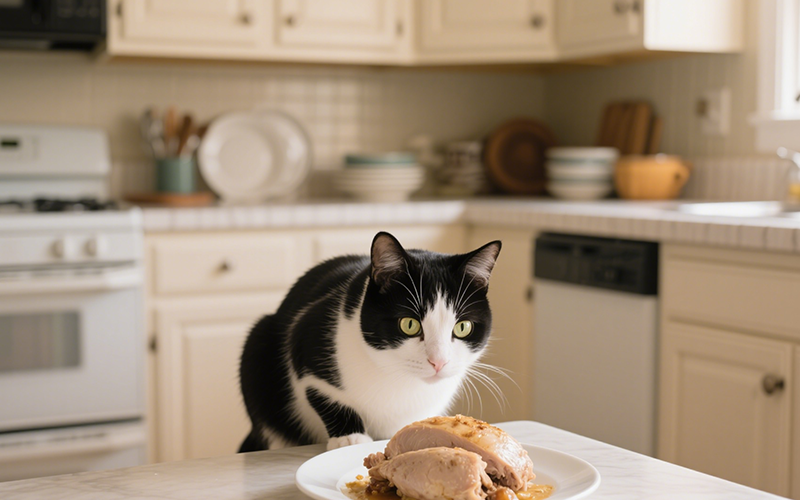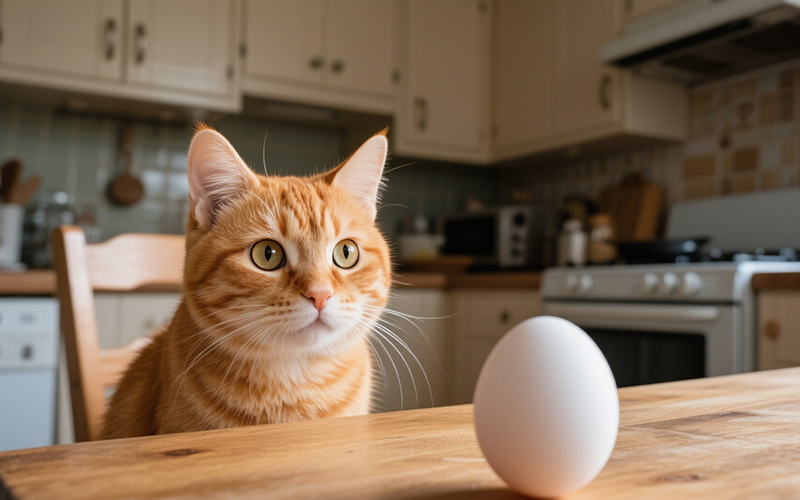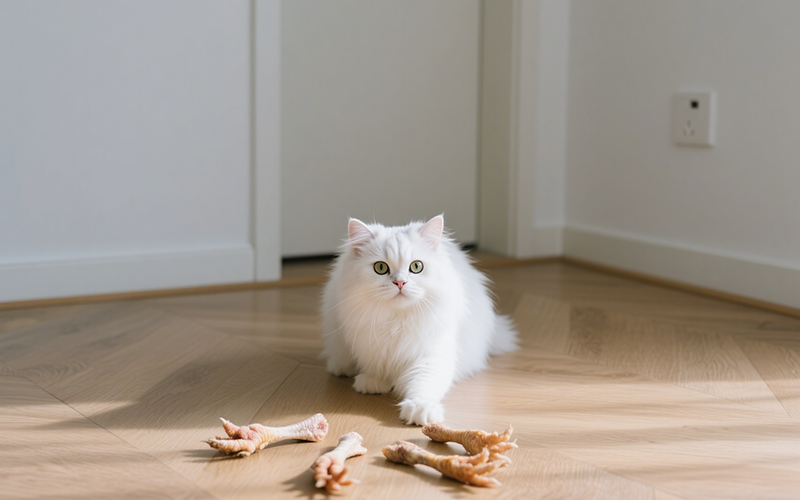Can Cats Eat Deli Turkey? Slicing Through the Facts for Your Feline!
- 29 May 2025 09:29
As cat owners, we often look for convenient treats or ways to entice a picky eater. Deli turkey, with its ready-to-eat nature and meaty appeal, might seem like a quick and easy option. This leads to the common question: can cats eat deli turkey? While a tiny, isolated piece of very plain deli turkey is unlikely to cause immediate severe harm to a healthy cat, it is generally NOT a recommended or healthy food for feline consumption on a regular basis. Deli turkey is often packed with ingredients that can be problematic for cats. This comprehensive guide will explore why this processed human food should largely be kept off your cat's menu.

Deconstructing Deli Turkey: Why It's Not Ideal for Cats
To understand why deli turkey isn't a great choice for cats, let's examine its typical characteristics and common ingredients:
1. High Sodium (Salt) Content
This is a primary and significant concern with most deli meats, including turkey.
Cats' Low Sodium Tolerance: Felines have a much lower requirement and tolerance for sodium compared to humans. Their bodies are not designed to process large amounts of salt.
Dehydration and Increased Thirst: Even a small amount of high-sodium food like deli turkey can make your cat excessively thirsty and potentially lead to dehydration if they don't compensate with increased water intake.
Sodium Ion Poisoning (Hypernatremia): Ingesting too much salt can lead to sodium ion poisoning, a serious and potentially life-threatening condition. Symptoms can include:While a single thin slice might not cause acute poisoning in a healthy adult cat, regular or larger servings significantly increase the risk.
Vomiting
Diarrhea
Lethargy
Incoordination, stumbling
Tremors
Seizures
Coma
Strain on Kidneys and Heart: A diet consistently high in sodium can put undue strain on a cat's kidneys and can be particularly dangerous for cats with pre-existing kidney disease or heart conditions.
2. Nitrates and Nitrites (Preservatives)
Deli meats, including turkey, are often cured and preserved using nitrates and/or nitrites. These compounds are added to:
Preserve the meat and inhibit the growth of harmful bacteria (like Clostridium botulinum).
Enhance the color (giving it a pinkish hue) and flavor.
While these are regulated for human consumption, their long-term effects on pets, especially in the quantities found in processed meats, are a concern. Some studies have linked high intake of nitrates/nitrites to certain health issues. For cats, whose systems are smaller and potentially more sensitive, it's best to minimize their exposure to these chemical additives.
3. Other Preservatives and Additives
Beyond nitrates/nitrites, deli turkey can contain a range of other artificial preservatives, flavor enhancers (like MSG), artificial colors, and stabilizers to improve shelf life, texture, and taste. These are generally unnecessary and potentially unhealthy for cats.
4. Seasonings and Flavorings (Potential for Harmful Ingredients)
While some deli turkey is marketed as "plain," many varieties are seasoned or flavored. These seasonings can include:
Garlic Powder or Onion Powder: These are sometimes included in "natural flavorings" or spice blends used in processed meats. Garlic and onions (all members of the Allium family) are HIGHLY TOXIC to cats. They cause oxidative damage to red blood cells, leading to Heinz body anemia. Even small, repeated exposures can be problematic.
Sugar or Sweeteners: Some deli meats have added sugars or other sweeteners for flavor, which are unhealthy for cats.
Other Spices: While not always toxic, a mix of unidentified spices can potentially cause digestive upset in sensitive cats.
5. High Fat Content (in Some Varieties)
While turkey breast is generally lean, some deli turkey products can still be relatively high in fat, especially if they include skin or are made from less lean parts.
Digestive Upset: High-fat foods can cause vomiting, diarrhea, and abdominal discomfort in cats.
Pancreatitis Risk: Though less common from lean deli turkey than from very fatty meats, a sudden intake of a fattier processed meat could contribute to pancreatitis in susceptible cats.
Obesity: Added fats contribute to calorie density, which can lead to weight gain if fed regularly.
6. Overall Processed Nature
Deli turkey is a highly processed food. As a general rule for pets, less processed, whole foods are preferable. The processing often strips some natural nutrients and introduces artificial ones or undesirable additives.
Given these factors, the answer to "can cats eat deli turkey?" leans heavily towards "it's best to avoid it."
Why Deli Turkey Doesn't Align with Optimal Feline Nutrition
Cats are obligate carnivores, requiring a diet primarily of animal-based protein and specific nutrients. While deli turkey is meat-based, its processed nature makes it fall short:
Nutritional Value vs. Risk: The potential risks from high sodium, preservatives, and questionable seasonings often outweigh any nutritional benefits the turkey meat itself might offer, especially when compared to plain, cooked turkey you prepare yourself.
Species-Appropriateness: Highly salted, cured, and seasoned meats are not part of a cat's natural diet. Their systems are adapted for fresh, unprocessed prey.
| Deli Turkey Component | Primary Risk to Cats |
| High Sodium (Salt) | Dehydration, Increased thirst, Potential for sodium ion poisoning, Strain on kidneys/heart. |
| Nitrates/Nitrites & Other Preservatives | Chemical additives generally unhealthy for cats; potential long-term health concerns. |
| Seasonings (Garlic, Onion, Spices) | Garlic/Onion HIGHLY TOXIC (anemia). Other spices can cause GI irritation. |
| High Fat Content (Some Varieties) | Digestive upset, Pancreatitis risk, Obesity. |
| Sugar/Sweeteners | Unnecessary, contributes to empty calories and potential health issues. |
What If My Cat Snatched a Piece of Deli Turkey?
If your cat manages to eat a small piece of deli turkey:
Stay Calm and Assess:
Determine how much was eaten. A tiny shred is less concerning than several slices.
If possible, check the packaging for ingredients, especially looking for onion powder, garlic powder, or high sodium levels.
Do NOT Induce Vomiting: Unless specifically advised by a veterinarian.
Monitor Closely for Symptoms: Watch for any signs of illness over the next few hours to several days (as garlic/onion toxicity can be delayed):
Vomiting or diarrhea
Excessive thirst or urination
Lethargy or weakness
Loss of appetite
Abdominal pain or discomfort
Pale gums, rapid breathing (signs of anemia from onion/garlic)
Contact Your Veterinarian or Pet Poison Helpline: This is crucial if more than a tiny morsel was eaten, if the deli turkey was known to be heavily seasoned (especially with onion/garlic), or if your cat shows any signs of illness. Provide them with:Your vet can advise on the best course of action.
ASPCA Animal Poison Control Center: (888) 426-4435 (consultation fee may apply)
Pet Poison Helpline: (855) 764-7661 (consultation fee may apply)
An estimate of the amount consumed.
Any known ingredients.
Your cat's approximate weight, age, and any pre-existing health conditions.
Provide Plenty of Fresh Water: Due to the potential high salt content, ensure your cat has easy access to fresh water.
PettureX: Your AI Assistant for Quick Pet Food Safety Queries
When you're unsure about the safety of a human food for your cat, like deli turkey, having access to quick, general information can be very helpful. The PettureX app is designed as an AI-powered resource for pet owners.
PettureX offers:
24/7 AI Consultation: You can ask general questions such as "Is high salt content bad for cats?" or "What are the signs of onion poisoning in felines?" The AI chatbot can provide instant information based on widely accepted veterinary knowledge. It can help you understand potential risks and symptoms to watch for, always emphasizing that for any suspected poisoning or illness, immediate veterinary consultation is essential.
PettureX can be a useful tool for quickly accessing general food safety information, helping you make informed decisions to protect your cat's health, alongside guidance from your vet.
Safer, Cat-Appropriate Meat Treats
If you want to offer your cat a special meat-based treat, bypass the deli counter and opt for these much healthier and safer alternatives:
Plain, Cooked Turkey Breast: Cook unseasoned, boneless, skinless turkey breast yourself (boil, bake, or steam). This provides all the benefits of turkey protein without the harmful additives.
Plain, Cooked Chicken Breast: Similarly prepared, this is another excellent lean protein treat.
Commercial Cat Treats: Choose high-quality treats specifically formulated for cats. Look for those that are high in animal protein and low in sodium, fat, and artificial additives. Single-ingredient meat treats are often a good choice.
Freeze-Dried Meat Treats: Options like freeze-dried turkey, chicken, salmon, or liver are species-appropriate and well-loved by many cats.
Remember, treats should only make up a small portion (no more than 10%) of your cat's daily caloric intake.
Conclusion: Deli Turkey – Best Left on the Sandwich, Not in the Cat Bowl
To definitively answer "can cats eat deli turkey?" – it is strongly recommended to avoid it. The high sodium content, preservatives like nitrates/nitrites, potential for harmful seasonings (especially toxic onion and garlic powder), and overall processed nature make deli turkey an unhealthy and risky choice for feline consumption.
While a single, tiny, plain piece might not cause immediate disaster for a healthy cat, it's not a food that should be intentionally offered. The potential for both short-term digestive upset and long-term health issues, as well as the risk of toxicity from certain ingredients, far outweighs any perceived benefit. Protect your cat by sticking to species-appropriate foods and treats, and keep the deli turkey for your own enjoyment.
Frequently Asked Questions (FAQs)
Q1: What if the deli turkey is labeled "low sodium" and "no nitrates/nitrites added"?
A: While these versions are slightly better, "low sodium" for human standards can still be too high for cats. Additionally, they may still contain other preservatives or "natural flavorings" that could include onion or garlic derivatives. It's still a processed meat and not as good as plain, home-cooked turkey. The risk is lower, but it's not an ideal treat.
Q2: Can cats eat other deli meats like ham or salami?
A: Generally, no. Most deli meats share similar issues with deli turkey: high sodium, high fat (especially salami and pepperoni), nitrates/nitrites, and potentially harmful spices. Ham is particularly salty. It's best to avoid all these for cats.
Q3: My cat seems to really love the taste of deli turkey. Why?
A: Cats are often attracted to salty and savory flavors, and the meaty texture is appealing. The salt and fat content can make it very palatable to them. However, their attraction doesn't mean it's good for them. Many things humans enjoy are not healthy for our pets.
Q4: Are there any "cat-safe" deli meats?
A: It's highly unlikely you'll find a commercial deli meat truly formulated and safe for regular cat consumption. The processing methods and ingredients used for human deli meats are just not aligned with feline dietary needs and safety. Your best bet is plain, home-cooked meat.
Q5: How can I tell if deli turkey contains onion or garlic powder if it's not explicitly listed?
A: This can be tricky. Sometimes it's hidden under "spices," "natural flavorings," or "spice extractives." If the ingredient list is vague or you're unsure, it's safest to assume it could contain them and avoid giving it to your cat.
Q6: Is turkey a common allergen for cats?
A: Turkey can be an allergen for some cats, just like chicken, beef, or fish. If you offer plain cooked turkey (not deli turkey) and notice signs of an allergic reaction (itching, skin issues, digestive upset), your cat might be sensitive to turkey protein.
Related

Can Cats Eat Egg Yolk Raw? A Vet's In-Depth Guide to Feline Nutrition & Safety
- 10 Jun 2025
Can Cats Eat Dog Kibble? Unpacking the Nutritional Mismatch!
- 29 May 2025
Can Cats Eat Deer Meat? Exploring Venison for Your Feline!
- 28 May 2025
Can Cats Eat Corned Beef? Unpacking This Salty Human Delicacy!
- 28 May 2025
Can Cats Eat Cooked Rice? The Grain Truth for Your Feline Friend!
- 27 May 2025
Can Cats Eat Cornbread? A Crumb of Truth for Curious Cat Owners!
- 27 May 2025
Can Cats Eat Cooked Meat? Sizzling Facts for Your Feline's Feast!
- 26 May 2025
Can Cats Eat Chili? Spicing Up the Truth About This Human Dish!
- 26 May 2025
Can Cats Eat Chicken Eggs? Cracking the Code on This Feline Food Query!
- 24 May 2025
Can Cats Eat Chicken Feet? A Paw-sitive or Negative Treat?
- 24 May 2025
